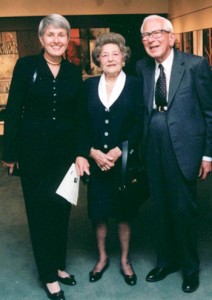Earlier this year, Irene Bettinger was looking for a good cause.
Her father, B.C. lumber mill owner Paul Heller, had recently died at the age of 101, just a year after her mother, Edwina, passed away. She now found herself looking for ways to put their estate to good use.
“Philanthropy was very important to my parents – it’s considered a responsibility in the Jewish community to take care of others,” she says.
So Dr. Bettinger, a neurologist in Kansas City, Missouri, was in a particularly receptive state of mind when she traveled to Philadelphia for the annual meeting of the American Academy of Neurology, and heard a presentation by Neil Cashman, a UBC Professor of Neurology.
His talk, “Prion-Like Diseases: The Future is Unfolding,” laid out his investigation of misfolded proteins and their connection to neurodegenerative diseases such as amytrophic lateral sclerosis and Alzheimer’s disease.
“It was one of the best talks of the Academy meeting,” she recalls. “This scientist is in the forefront of the field, and he put forward his vision in such a clear, convincing way. I came away from his talk excited.”
From that not-so-chance encounter, Dr. Bettinger decided to donate $210,000 to fund a postdoctoral fellow in Dr. Cashman’s lab – someone to help block the misfolding of proteins, so they remain in their proper, non- pathological shape.
“We’re after actual cures for these protein-related diseases, and it’s a very, very expensive process requiring millions of dollars over the long term,” says Dr. Cashman, a member of the Djavad Mowafaghian Centre for Brain Health. “We greatly appreciate donors like Dr. Bettinger, who contribute support over several years. It allows us to concentrate on the work, and that is absolutely invaluable.”
Dr. Bettinger named the fellowship for two of her parents’ close friends, Ludmila and Henry Zeldowicz, who, like the Hellers, were Polish refugees from the havoc of World War II. Ludmila, known as “Lola,” was a Clinical Assistant Professor in UBC’s Division of Neurolog y (and one of the first female neurologists in British Columbia) and Henry was a Clinical Assistant Professor in the Department of Psychiatry.
“What Dr. Cashman is doing at UBC would have excited both of them, especially Lola – not only because she was a neurologist, but because she died of complications relating to Alzheimer’s disease,” Dr. Bettinger said on a recent visit to Vancouver. “The fact that this work is going on at UBC, where they were faculty members, made it the perfect way to honour them.”
Appropriately, the Zeldowicz fellowship will go to yet another female scientist, Judith Maxwell Silverman, who received her PhD from UBC in Immunology and Microbiology in 2010, and shared the award for top graduating doctoral student in the Vancouver Coastal Health Research Institute.
Dr. Bettinger considers the job of giving away money a privileged one because she gets to choose projects that ref lect her parents’ final wishes. She also has donated money for UBC fellowships in forestry and opera, as well as robotics training for UBC urolog y residents and fellows. (Her father died of bladder cancer.) “My mother loved people and my father loved education, so creating fellowships made perfect sense,” she says. “Medicine, the arts, forestry, and helping young people get a better education – all these things they would have loved.”

